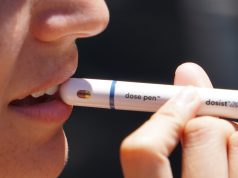After a singing gig at a Fort Lauderdale hotel near the beach last November, Elisa Chavez drove back home thinking it was just another rainy day in Florida.
But then she began to notice the extremity of the downpour. As she was about to enter the highway, her car stopped running.
Chavez stepped out of her Honda Civic in disbelief as the water reached over her ankles. After waiting several minutes in the cold rain, she got a ride from a co-worker. Her car was towed to her house the next day.
“The repairs were more than the cost of the car and my insurance didn’t cover it either, which I was a bit upset about,” said Chavez. “I think I saw some other cars flooding too that night.”
When Chavez arrived home that night, water had leaked into her kitchen. Chavez’s experience is one that many Floridians know too well.
In April 2023, thousands of South Florida drivers filed similar insurance claims after their vehicles were damaged by flooding, according to Mark Friedlander, a spokesperson with the Insurance Information Institute, who spoke with Local 10 News last year.
“We have sea level rise and climate change, they’re combining to bring us worse flooding,” said Alex Harris, the lead reporter for the Miami Herald’s climate team. “More intense rainstorms are becoming more common as the planet warms and the number one thing I think we would need to fix a lot of this is money.”
South Florida’s interaction with water such as rising sea-levels, humidity and extreme weather has raised concern. This climate-related issue has called for a project embracing climate resilience in South Florida communities.
In October 2023, the U.S. Economic Development Administration designated 31 tech hubs across the country to promote innovation and more job opportunities. By investing in these high-potential regions, the goal is for the funded tech hubs to scale globally with their innovative technologies. By August of this year, the EDA will only fund five to ten of the tech hubs with each of them receiving $40 to $70 million to carry out their proposed projects.
The South Florida ClimateReady Tech Hub was the only hub designated in Florida and the only one targeting climate resilience.
The designated tech hubs were eligible to apply for Phase II of funding until this past Feb. 29. South Florida’s tech hub put in an application for $75 million, 10% of that being matched locally, making the request over $65 million.
“They (the EDA) also have the option to only fund portions of what we propose. We proposed six specific projects at different amounts, and they could fund the whole thing, or they could fund just some of those projects,” said Galen Treuer, the Miami-Dade County climate tech and economic innovation manager.
Projected plan for ClimateReady Tech Hub
Although the South Florida ClimateReady Tech Hub is not currently working directly to combat inland flooding, it has partnered with companies such as KindDesigns and 1Print that use their 3D printed products to act as a coastal defense.
Both of these companies use a green-gray infrastructure approach, creating 3D printed seawalls and reefs to protect shorelines and coastal ecosystems.
With funding from the EDA, 1Print could potentially scale and begin executing inland projects.
“The advantages of 3D printing manufacturing is that it can be localized,” said Adam Friedman, the co-founder of 1Print.
“A 3D printer can be set up within hours and start producing infrastructure that can be placed just feet away. We can bring a machine to the area, say it’s an inland canal, whether it’s in a parking lot or an open area, we can produce many seawalls in a rapid amount of time.”
One student interning at Florida International University’s government relations office in Washington, D.C. spent her last semester of college advocating for the tech hub through her research.
Katherine Mesa, a political science major, researched how public research institutions, such as FIU, are pushing forward environmental resilience. Mesa also created a comprehensive list of federal officials who then flew down to Miami to learn more about FIU’s environmental related research.
One of the facilities visited was FIU’s Wall of Wind, a large-scale wind engineering testing facility used to simulate hurricanes, which is associated with the ClimateReady Tech Hub.
“I had the opportunity to submit over 50 programmatic and language appropriation request forms in order to appropriate money from the federal government towards our (FIU) research initiatives,” said Mesa.
By August, the EDA will announce which few tech hubs will be funded.
Now it is a matter of waiting, and Mesa is hopeful to see South Florida’s TechHub achieve successful funding so it can reach its full potential in producing climate resilient technologies.
“We could see sea level rise and flooding impacting our communities,” said Mesa. “I think what they’re doing is incredible, and I look forward to seeing it come to fruition.
































